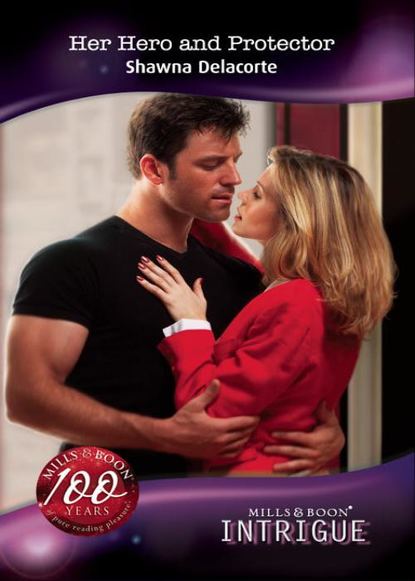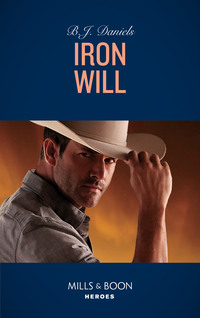
Полная версия
The Mystery Man Of Whitehorse
Little was left of the small ranching community. At one time there’d been a gas station, but that building was sitting empty, the pumps long gone. There was a community center, which was still called Whitehorse Community Center. Every small community in this part of Montana had one of those. And there was the one-room schoolhouse next to it.
There were a few houses, one large one that was boarded up, a Condemned sign nailed to the door, an old shutter banging in the wind.
For years the community had been run by Titus and Pearl Cavanaugh, both descendents of early homesteaders and just as strong and determined as the first settlers.
Titus was as close to a mayor as Old Town had. He provided a church service every Sunday morning at the community center and saw to the hiring of a schoolteacher when needed.
Pearl’s mother Abigail had started the Whitehorse Sewing Circle. The women of the community got together a few times a week to make quilts for every new baby and every newlywed in the area.
The old cemetery on the hill had also kept the Whitehorse name. The iron on the sign that hung over the arched entrance was rusted but readable: Whitehorse Cemetery.
Bridger had learned a lot about the area just stopping at a café in Whitehorse proper, five miles to the north and the last real town for miles. All he’d had to do was ask about Old Town Whitehorse and he got an earful. The people were clannish and stuck to themselves. The old-timers still resented the town moving and taking the name. And, like Whitehorse proper, both communities were dying.
A lack of jobs was sending the younger residents to more prosperous parts of the state or the country. The population in the entire county was dropping each year. People joked about who would be around to turn the lights out when Whitehorse completely died.
While Bridger had learned a lot, he hadn’t gotten what he’d come here to find. Not yet, anyway.
And now he’d made the acquaintance of Pearl’s granddaughter, Laci. She was a cute thing, fair skinned, slender, with short curly blond hair and blue eyes.
Life was strange, he thought as he continued to search the old newspapers. In a way, his life had started here. And now here he was, thirty-two years old and back here in hopes of finding himself.
The one thing he’d learned quickly was that being an outsider was a disadvantage in a small Montana town. Not that he’d expected to be accepted immediately just because he lived here and was now opening a restaurant.
But he’d found it was going to take time. Fortunately, time was the one thing he had plenty of.
His eye caught on a notice in one of the old news-papers he’d been thumbing through. A city permit for a fence at a house owned by the late Dr. Holloway.
Bridger felt a rush of excitement. For months he’d been trying to track down his birth mother after finding out that he was adopted.
Not just adopted—illegally adopted. The story his adoptive mother told him on her deathbed involved a group of women called the Whitehorse Sewing Circle.
Thirty-two years ago, his parents, both too old to adopt through the usual channels, had gotten a call in the middle of the night telling them to come to the Whitehorse Cemetery.
There an elderly woman gave them a baby and a birth certificate. No money exchanged hands. Nor names. Bridger had surmised over his time here that the woman in the cemetery that night was none other than Pearl Cavanaugh.
How a group of women had decided to get into the illegal adoption business was still beyond him. Nor did he know how many babies had been placed over the years.
He’d come to town months ago, rented an old farm-house just outside of Old Town and begun his search.
Unfortunately, his quest had come at a high price. Most of the people involved were now dead. The doctor who Bridger believed had handled the adoptions—Dr. Holloway—had been murdered by one of his coconspirators, his office building burned to the ground, all records apparently lost.
The woman he believed to be the ringleader, Pearl Cavanaugh, had suffered a stroke. Another key player, an elderly women named Nina Mae Cross, had Alzheimer’s. Both women were in the nursing home now. Neither was able to tell him anything.
But Bridger was convinced Holloway was too smart to keep records of his illegal adoption activities with his patients' medical records at the office. So he held out hope that the records would be found elsewhere.
But where would the doctor have hidden them to make sure they never surfaced? Maybe in this house Bridger had discovered.
Or maybe no records had been kept. Certainly no charges had been filed against anyone involved, for lack of evidence.
But even if Bridger found proof, not one of the women in the original Whitehorse Sewing Circle was less than seventy now. None would ever see prison. The only thing he could hope for was learning his true identity.
“Even if you had proof that would stand up in court,” the sheriff had said, “you sure you want these women thrown in jail? If they hadn’t gotten you and your twin sister good homes, neither of you might be alive today.”
Bridger knew he probably owed his life to the Whitehorse Sewing Circle. The women had taken babies who needed homes and placed them with loving couples who either couldn’t conceive or were ineligible to adopt because of their age.
Also, something good had come out of his quest: he’d found his twin sister, Eve Bailey. Eve had grown up in Old Town and suspected from an early age that she was adopted. She’d come back here also looking for answers and, like him, had ended up staying.
As he copied down the address of the house that Dr. Holloway had owned, he felt a surge of hope. The doctor had lived in an apartment over his office. So what had he used the house for?
Bridger tried not to get his hopes up, telling himself that if he didn’t find anything at the house, there was always Pearl Cavanaugh’s granddaughter.
One way or the other, maybe he’d finally get lucky.
LACI JUMPED WHEN THE phone rang and picked it up before even checking caller ID. She’d been thinking about Alyson, so she’d just assumed it would be her.
“Laci?”
“Maddie?” She realized she hadn’t heard from her cousin in weeks, not since Maddie Cavanaugh had moved to Bozeman to attend Montana State University. “How are you?”
“Great. Really great,” Maddie said, sounding like her old self again.
Laci couldn’t have been more relieved. Maddie had been through so much, not the least being suspected of murder. But probably the hardest was her breakup with her fiancé, Bo Evans.
The hold Bo had on Maddie was still a concern. Laci feared that Maddie might weaken and go back to that destructive relationship.
“So tell me about your classes,” Laci said, and Maddie launched into an enthusiastic rundown. She sounded so happy that Laci began to relax a little.
Counseling and college seemed to have helped Maddie put Bo Evans and a need to punish herself behind her.
Maddie asked about Laci’s catering business, and Laci quickly changed the subject. Her lack of business was the least of her worries right now, but she didn’t want to get into the Alyson and Spencer situation with her cousin.
“I have a test first thing in the morning, so I’d better go,” Maddie said after they’d talked for a while. “I wanted to let you know that my roommate has invited me home for Christmas. She’s from Kalispell, so…”
Laci tried to hide her disappointment. Maddie had planned to spend Christmas with her. Laney and Nick had already made plans to have Christmas with his family in California. “Oh, you’ll have a great time. What a nice invitation.”
“You don’t mind?” Maddie asked, sounding relieved.
“Of course I will miss you, but I’m so glad you’re enjoying college and making friends.” Laci knew that Laney would now insist she come to California—the last thing she wanted to do. Christmas required snow. Christmas was Montana. Also, she couldn’t leave her grandfather alone for the holidays.
“I’m really proud of you,” Laci said. “You’ve been through a lot.”
“You know us Cavanaugh women,” Maddie said with a laugh. “I’m excited about the future.” Her cousin sounded surprised by that. After everything she’d been through, it was no wonder.
Laci hung up, relieved that Maddie hadn’t asked about Bo Evans. Maybe she was finally over him. Laci would rather believe that than believe Maddie hadn’t wanted to come home for Christmas because she was afraid to see Bo again. Either because she feared she might be tempted or because she was scared of the Evans family. Laci could understand being afraid of that family.
ARLENE EVANS COULDN'T believe the mental hospital wouldn’t let her see her daughter Violet.
“I told you they wouldn’t let us in,” Charlotte said as she inspected the ends of her long blond hair.
Arlene glanced over at her younger daughter as she put the car into gear. More and more, Charlotte was starting to annoy her. The whiny voice. The obsession with her split ends. The way she’d put on weight since the “incidents.”
Arlene insisted the family all refer to the attempts on her life as “those unfortunate incidents” if they had to refer to them at all. She would just as soon forget the whole thing. But that was a little difficult since the entire country had heard about her three children trying to kill her.
It had almost cost Arlene the farm in lawyer fees to get her two youngest off. It had cost her her husband. Floyd divorced her and ran off with some grain seed saleswoman. Good riddance. She’d leased out the land and would be just fine now that her Rural Meet-A-Mate Internet dating service was doing so well. Being on national TV hadn’t hurt.
Whatever the cost, it had been worth it to get Charlotte and Bo cleared. In her own mind, Arlene knew where the blame for the whole mess lay: her old-maid daughter Violet. Violet had always been the problem child. Charlotte, barely eighteen, and Bo, now twenty, would never have even contemplated the terrible things they’d done without Violet as the ringleader.
Alice Miller, that old busybody who lived down the road, had suggested the children were fed too much sugar. The woman really needed to turn off the talk-show television and take care of her own business.
Fortunately, Arlene had been able to hire a good lawyer for Charlotte and Bo and got them probation. The judge had insisted they come home and live with her so they could begin to heal. Arlene wasn’t sure that’s what had been going on at the house, though.
Bo stayed in his room listening to that horrible music and barely had a civil word for her, except late at night when he went out doing who knew what. Charlotte, restricted from going into town on Saturday nights because of those other unfortunate incidents involving strange men, hung around the house and ate.
Half the time, Arlene couldn’t stand the sight of her own children. Now there was an episode for the talk shows.
The only way she’d been able to stay sane was to concentrate on her business. Her Internet rural dating business had taken off after she’d been interviewed on one of the national morning TV shows. But many locals were still wary of the Internet. She’d been forced to remove some people’s profiles who hadn’t asked to be put on her Web page. The ingratitude of people still amazed her.
Like the Cavanaughs. The whole bunch of them blamed Bo for Maddie’s problems. All Arlene could say was good riddance to that one, too. She hated to think what Bo’s life would have been like if he’d married that girl.
Arlene couldn’t believe the injustice in the world. That’s probably why, when she got to the point that she found herself finding fault with Charlotte and Bo, she would turn all her anger and frustration on the one person who really deserved it—her oldest daughter, Violet. On the fast track to thirty-five and insane, Violet had little chance of ever getting married now. And wasn’t it just like everyone to blame the mother for it.
“I’d love to give Violet a piece of my mind,” Arlene said as she left the mental hospital, tires spitting gravel. She’d even hired a lawyer, but the hospital hadn’t budged, saying that it would not be in Violet’s best interest to see her mother. As if Arlene gave a fig about Violet’s best interest.
Did Violet appreciate all the years Arlene had labored tirelessly to try to get her married off? No. How did Violet pay her back? She’d tried to kill her own mother and had drawn in her younger sister and brother as accomplices.
“Sometimes I just don’t know why I try,” Arlene said and sighed as she drove toward Old Town Whitehorse. Beside her, Charlotte pulled a candy bar from her jacket pocket, at least her third this morning.
“Watch where you’re going!” Charlotte yelled as the car almost went off the road. “What is your problem?”
Arlene got the car back on the road and looked over at her daughter again. She’d never noticed before how much Charlotte was beginning to resemble her sister Violet.
BACK AT THE HOSPITAL, Violet Evans felt the drool run down her chin but didn’t move a muscle to stop it.
“Violet?”
She stared into nothingness, her eyes glazed over, her mind miles away. Miles away in Old Town Whitehorse.
“Violet, can you hear me?”
The doctors called her condition a “semicatatonic state.” She’d been like this ever since she’d been brought to the mental hospital after admitting to trying to kill her mother. It was a textbook-classic case, she’d heard the doctors say and had to suppress the urge to laugh.
It should be textbook-classic; that’s where she’d found the symptoms for the condition. Lately, though, the doctors had noticed that she was starting to come out of it.
Violet loved fooling with them. One day soon she would come out of it, all right. She wouldn’t remember anything. When they told her about her crimes, she would be shocked, feel incredible remorse for the misery she’d caused and find it almost unbearable.
There would be suspicion with her apparent confusion about where she’d been, what she’d done. There would be more psychiatric tests, but finally they would have to release her back into society. They would have to since she’d clearly been sick when she’d tried to kill her own mother. And soon she would be well.
But for now, Violet Evans saw nothing, felt nothing, was nothing. At least on the surface. Her mind worked 24-7, planning and plotting for the day when she would walk out the front door of the hospital a free woman.
Inside, she smiled to herself. It wouldn’t be long now. Soon she would be free. Only this time she would be much smarter. This time she wouldn’t get caught. Nor was she just going to finish the job she’d started. That was the problem with too much time to think—it made you realize there were a lot of people you wouldn’t mind seeing dead.
THE PHONE RANG THE minute Laci hung up from talking with her cousin. She smiled as she picked up the receiver, sure it was Maddie calling her back.
“What did you forget to tell me?” she said without bothering to say hello.
Silence.
“Maddie?”
No answer.
She checked the caller ID. Blocked. Her heart began to pound as she recognized the faint sound of someone breathing on the other end of the line.
She told herself there was nothing to be frightened about. It was just a bad connection. Then why could she hear the breathing just fine? “Hello?”
Still no answer.
“What do you want?” she demanded into the phone.
The caller hung up with a click.
Her heart drummed in her chest as she tried to convince herself it was just a wrong number. She hung up and hit star-6-9.
The recording confirmed that the phone number could not be accessed.
She hung up, telling herself she was overreacting. As usual. But now she was spooked, the call feeling like an omen.
Chapter Three
At the sound of a car, Laci wandered into the living room, still feeling under the weather. And while she was relieved about Maddie, she couldn’t get Alyson out of her mind. Or the strange phone call.
One of Alyson’s bridesmaids, a younger friend they’d both grown up with, trotted up the front steps.
Laci opened the door, glad to see McKenna Bailey. McKenna, all cowgirl, was dressed in jeans, western shirt, boots and a straw western hat pulled down over her blond hair.
“I guess I don’t need to ask how you’re feeling,” McKenna said with a laugh. “I couldn’t believe you last night. I’ve never seen you drink that much.”
Which could partly explain why she felt so horrible. But she knew the perfect cure of whatever ailed her.
“Pancakes,” Laci said drawing McKenna into the kitchen.
“Pancakes? You can’t be serious,” McKenna said as she took off her cowboy hat and set it on the stool next to her at the breakfast bar.
“Pumpkin pancakes.” As Laci whipped up the batter, she began to feel better. Cooking always did that for her. McKenna talked about the wedding ceremony, the food at the reception—the town women had insisted on doing a potluck, almost as if there were a plot against Laci and her catering company.
Ever since she’d decided to start Cavanaugh Catering, nothing had gone right. True, her first catered party had ended with a woman being poisoned to death—not Laci’s fault, though.
Since then, she hadn’t had any business and was starting to wonder if her sister had been right about it being a mistake to run a catering business here in the middle of nowhere.
Laci spooned some of the golden batter into a sizzling-hot skillet. The smell alone made her feel better.
“Spencer is really something, huh?” McKenna said.
Laci shot a look over her shoulder at McKenna. “He’s handsome enough,” she said noncommittally.
McKenna laughed. “Arlene Evans is positive she’s seen him in one of her movie magazines.” She lowered her voice. “But you should have heard what Harvey Alderson said.”
Laci could well imagine, knowing Harvey.
“He said the guy looked like a porn star to him,” McKenna said and laughed again. “Makes you wonder what Harvey knows about porn stars, doesn’t it?”
Laci laughed and turned back to her cooking. The pancakes had bubbled up nicely. She flipped each one, then brought out the apple-cinnamon syrup and fresh creamery butter and put them on the counter in front of McKenna, happy her friend had stopped by. She wished McKenna was home for more than the weekend.
“The thing about men as good-looking as Spencer Donovan—you’d have to keep him corralled at home,” McKenna said, only half joking. “Every woman in the county would be after him. Speaking of men…I did something really stupid last night.”
Laci couldn’t imagine McKenna Bailey doing anything stupid in her life. She hadn’t even had that much to drink last night. “What?”
“I signed up on Arlene Evans’s rural dating Internet site,” McKenna said and grimaced. “I’m never going to find my handsome cowboy helping Eve with the ranch. Or at vet school. I figured, what would it hurt, you know?”
“I know,” Laci said with a laugh as she slid a plateful of silver-dollar pancakes in front of McKenna and watched her slather them with butter before making another skilletful for herself.
Was that all it had been last night? A splash of champagne and a shot of envy, stirred not shaken, with a healthy dose of vivid imagination? She sure hoped so because she really didn’t want her friend to be in trouble. She glanced at the kitchen clock over the stove as she sat down, not even hungry for her favorite pancakes. Alyson would be in Honolulu soon.
“Laci, these pancakes are to die for,” McKenna said between bites. And the conversation turned to Laci’s catering business—and lack of clients. And for a while Laci stopped worrying about Alyson and worried instead about how to get Cavanaugh Catering cooking.
BRIDGER DUVALL SNAPPED on his flashlight as he descended the rickety basement stairs of Dr. Holloway’s former house. It was dusty and dark down here, the overhead light dim. The place, he’d learned, had been sitting empty for years. He doubted anyone had been down here in all that time.
“Can’t be much of interest down there, but you’re welcome to look, I guess,” the elderly neighbor said from the top of the stairs.
“Thanks,” Bridger called over his shoulder as he descended deeper. He’d managed to talk the neighbor into letting him into the house after discovering it was empty, and the man thought he knew where there might be a key.
In a town like Whitehorse, neighbors were often given a spare key to the house next door. Bridger loved that about this part of Montana. As it turned out, the door hadn’t even been locked.
A house that the doc owned—but apparently had never lived in—seemed like the perfect place to store records you didn’t want anyone to ever see.
The basement smelled of dampness and mildew. He stopped on the bottom stair. He heard something scurry across one dark corner and shot his flashlight beam in that direction quick enough to catch the shape of a mouse before it disappeared into a hole in the concrete.
Great. Who knew what else lived down here.
Bridger shone the flashlight around the small, damp basement. It was little more than a root cellar. He brushed aside the cobwebs to peer into a hole that ran back under the house. There was a lot of junk down here, most of it looking as if it had been there since the house was originally built a hundred years before.
One box held what appeared to be women’s clothing. He held up one of the dresses. Dated. Had the clothes belonged to the doctor’s wife before her death? Or had the doctor had a mistress who’d lived here?
Bridger dug through several of the boxes, finding more old clothing but no files. No records.
He couldn’t help his disappointment. He’d hit one dead end after another. In the last box he opened he found an old photo album. He flipped it open. Most of the pages were empty except for a few colored photographs of two little girls. Children who’d been part of the adoption ring?
Tucking the album under his jacket, Bridger climbed up out of the basement, anxious for some fresh air.
The helpful neighbor was waiting in the living room. “Find anything?” he asked.
“Nothing much.” He’d told the old man that he was looking for his mother’s medical records. No lie there. He feared the man wouldn’t let him take the photo album if he told him about it, so he kept it hidden under his jacket.
Bridger handed him back the key, thanked him and took one last look at the inside of the house, wondering why Dr. Holloway had kept it and whose clothing that was downstairs. The dresses had been in different sizes, so that seemed to rule out a mistress.
A thought struck him, giving him a chill. Was it possible the birth mothers had stayed here in this house until they’d given birth? Maybe even Bridger’s own mother?
The used furniture appeared to be a good thirty years old and was now covered in dust. If his mother had stayed here, there was no sign of her after all this time.
He followed the old man out the front door, glancing back only once. For just a split second he imagined a woman standing at the front window, her belly swollen with the fraternal twins she carried, her face lost behind the dirty window.
TO KEEP FROM CALLING Alyson and ruining her honeymoon, Laci tried to stay busy. She cooked everything she could think to make, then had to find a home for all the food.
She dropped off a week’s meals at her grandfather Titus’s apartment—the one he’d taken in town so he could spend more time at his wife’s bedside at the nursing home.
Gramma Pearl’s condition hadn’t changed since her stroke. Her eyes were open, but she wasn’t able to respond, even though Laci liked to believe she knew her and understood what Laci said to her. Once, Laci would have sworn her grandmother squeezed her hand. Laney said it must have been her imagination.












